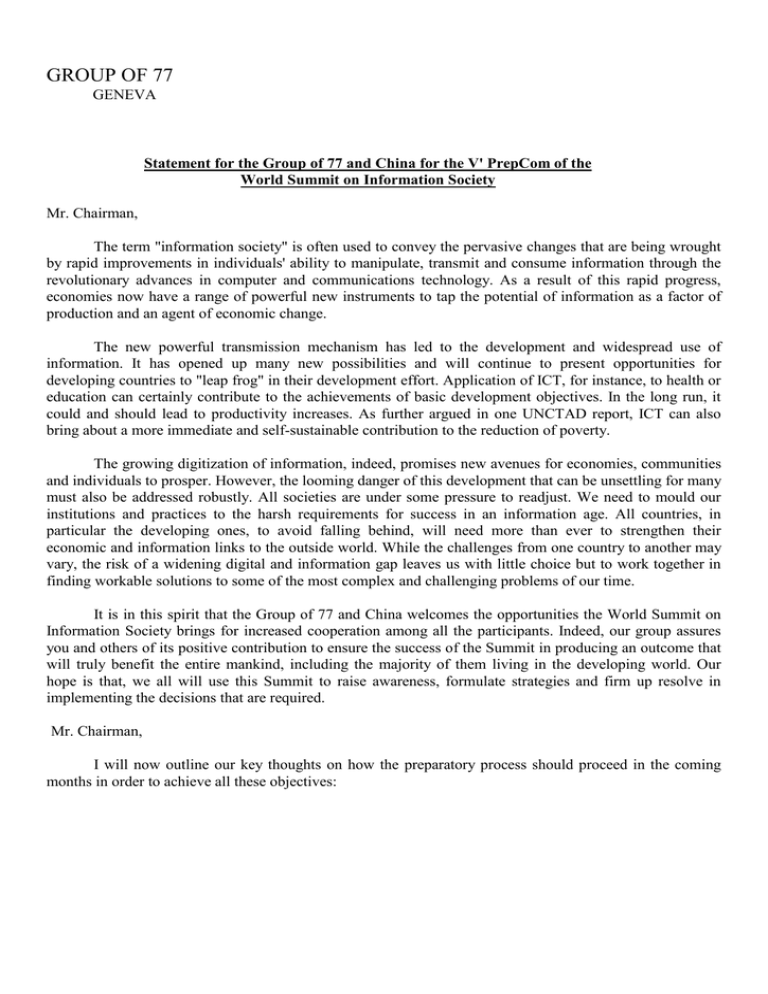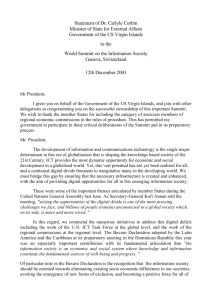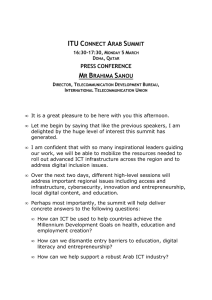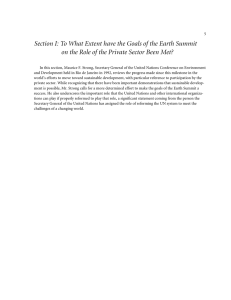GROUP OF 77
advertisement

GROUP OF 77 GENEVA Statement for the Group of 77 and China for the V' PrepCom of the World Summit on Information Society Mr. Chairman, The term "information society" is often used to convey the pervasive changes that are being wrought by rapid improvements in individuals' ability to manipulate, transmit and consume information through the revolutionary advances in computer and communications technology. As a result of this rapid progress, economies now have a range of powerful new instruments to tap the potential of information as a factor of production and an agent of economic change. The new powerful transmission mechanism has led to the development and widespread use of information. It has opened up many new possibilities and will continue to present opportunities for developing countries to "leap frog" in their development effort. Application of ICT, for instance, to health or education can certainly contribute to the achievements of basic development objectives. In the long run, it could and should lead to productivity increases. As further argued in one UNCTAD report, ICT can also bring about a more immediate and self-sustainable contribution to the reduction of poverty. The growing digitization of information, indeed, promises new avenues for economies, communities and individuals to prosper. However, the looming danger of this development that can be unsettling for many must also be addressed robustly. All societies are under some pressure to readjust. We need to mould our institutions and practices to the harsh requirements for success in an information age. All countries, in particular the developing ones, to avoid falling behind, will need more than ever to strengthen their economic and information links to the outside world. While the challenges from one country to another may vary, the risk of a widening digital and information gap leaves us with little choice but to work together in finding workable solutions to some of the most complex and challenging problems of our time. It is in this spirit that the Group of 77 and China welcomes the opportunities the World Summit on Information Society brings for increased cooperation among all the participants. Indeed, our group assures you and others of its positive contribution to ensure the success of the Summit in producing an outcome that will truly benefit the entire mankind, including the majority of them living in the developing world. Our hope is that, we all will use this Summit to raise awareness, formulate strategies and firm up resolve in implementing the decisions that are required. Mr. Chairman, I will now outline our key thoughts on how the preparatory process should proceed in the coming months in order to achieve all these objectives: 2 First and foremost, we want the Summit to focus on ICT-related issues from the development angle. It goes without saying that overcoming the digital divide or perhaps, more aptly, creating digital opportunities, is an important agenda of our work. In the coming months, we would like to see greater attention be given to how this is to be effected. Undoubtedly, we will not be starting from scratch since many works have already been done at various levels, and many more will be carried out, covering the whole spectrum of issues. We should look at them closely to spot what should appropriately be brought to the main table. As I've already alluded, economies and societies from different starting points will have different set of priority and will attach greater relevance to different issues on the menu. Obviously, one-size-fits-all solution is not the best and most pragmatic approach. Each and every country should be allowed to seek its own solutions that fit the appropriate circumstances, in order to realize its nationally defined vision of an information society Nevertheless, we believe that the Summit needs a clear focus to ensure that the environment we are working in remains constructive. For the developing country members of G77 and China, infrastructure and access, and human resource development and capacity building, education and health, are topmost priority. We believe that these, together with the effort to provide favorable environment for business, should form the core of our work. We should focus our work, for example, on the development of telecommunication infrastructure and in providing affordable access to the information highway especially for the disadvantaged population in both urban as well as rural areas. We should talk more about delivering education and health services through the internet and empowering our very own small and medium sized enterprises that form the vital backward linkage to the domestic economy. The challenges to accomplish all these goals cannot be overcome by governments alone, and we recognize the need to mobilize the various international organizations as well the private sector to help implement them. This Summit should be innovative in persuading the international businesses that there is a correlation between a good and sustainable business plan and contribution towards meeting the developmental goals as specified in the Millennium Summit Declaration. In cases where the market fails to efficiently deliver the goods, we should be looking at policies that would help redress the situation. A serious consideration for the LDCs is also warranted given the fact that digital divide between them and the rest of the world is widening. The lack of access to technology, poor telecommunication infrastructure, poor literacy and absence of adequate financial resources stand in the way of development of their ICT sector. It is, therefore, important for the international community to consider measures to assist these countries develop and benefit from the ICT. There are many other examples that can be cited, but it is sufficient for me now to say that, instead of framing our discussion around too broad and abstract a concept that can create controversies, we should opt for themes that will bring out the best in our cooperation. Mr. Chairman, One immediate step we can take in our preparatory work is to start assessing our own state of e-readiness in confronting these challenges. A very important element in this exercise, in our view, is 3 to identify and list the barriers or bottlenecks to overcoming the digital divide in the following key areas. First of all, our preparatory process in the coming months needs to look at the problems arising from the lack of telecommunication infrastructure with a view to finding the right strategies to overcoming them. Foreign direct investment and other sources of funding will continue to be important in this regard, and along with the equally crucial role of the local businesses, these issues must feature most prominently in our discussion. Secondly, we should identify the various obstacles developing countries are encountering in accessing market and information for their ICT related products and services. We also need to pay special attention to local content development. We hope that these works would lead us to prodevelopment solutions that could be considered in other forums such as the WTO, in line with the commitment by Ministers in Doha to place the needs and interests of developing countries at the heart of the WTO's work programme, as specified in Paragraph 2 of Doha Ministerial Declaration (WT/MIN(O I)/DEC/W/1) . Thirdly, the issues relating to the transfer of technology, including its link to FDI, must be addressed. For decades, developing countries have taken serious efforts to gain access to foreign technology and capabilities, and we hope that this Summit will help improve the international arrangement on technology transfer in favour of developing countries. Fourthly, ways and means to cooperate in improving the standard of education and in developing the human resources of the developing countries so as to enable the population in these countries to connect and fully benefit from the ICT should be explored. We hope that in our preparatory process we will identify possibilities to bring universities, learning institutions and research organizations from the developed and developing countries together taking full advantage of the powerful medium. Finally, it would be useful to look at the various models that help promote the use of the ICT to bridge the digital divide. In this regard, we kindly request the Secretariat to compile various national and regional experiences in the relevant policy areas as options for our consideration and possible application, on a voluntary basis. Mr. Chairman, This is a real opportunity for the world leadership to "marshal the global consensus and commitment required to promote the urgently needed access of all countries to information, knowledge and communications technologies for development so as to reap the full benefits of the information and communication technologies revolution". We have now a real chance to help convert digital divide to digital opportunities, and 1 hope we will take it. Thank you


